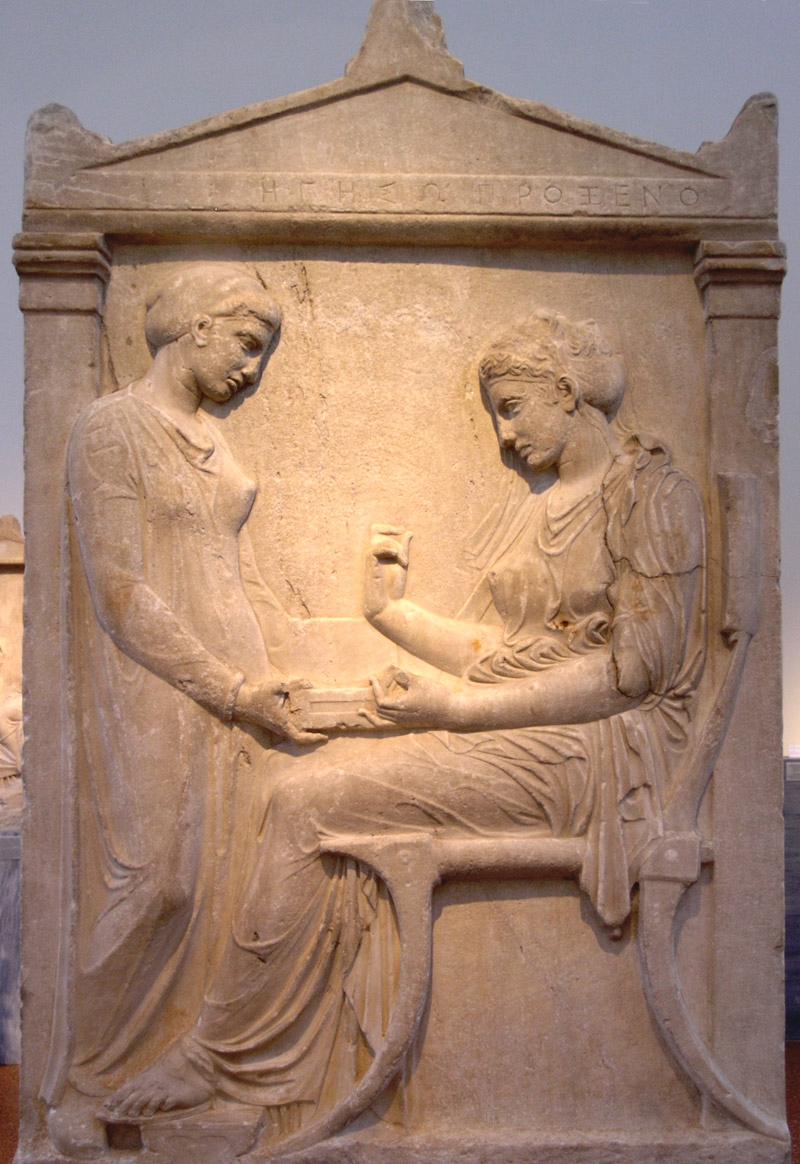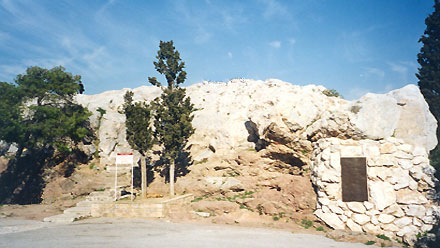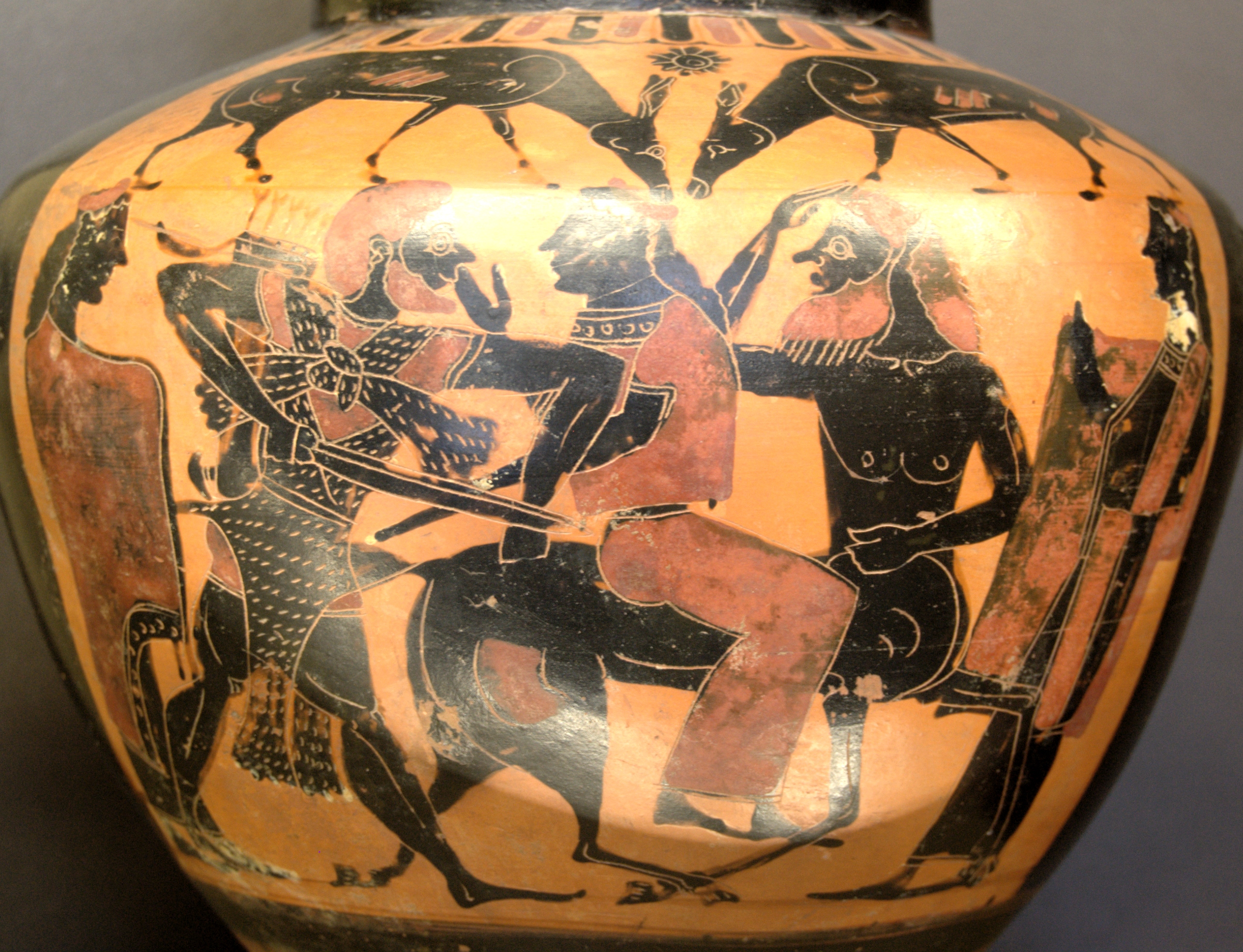|
Against The Stepmother For Poisoning
"Against the Stepmother for Poisoning" ( grc, Φαρμακείας κατὰ τῆς μητρυιᾶς) is one of fifteen extant speeches by the Athenian orator Antiphon. It is a speech for the prosecution in the case of a woman accused by her stepson of arranging for the murder of his father, her husband. The speech does not provide any evidence for the claims made by the prosecution, but instead attempts to appeal to the emotions of the jurors. As with most surviving legal speeches from classical Athens, the outcome of the case is unknown. Background The speech was given as part of a trial of a woman for killing her husband some years previously. The husband had visited his friend Philoneus and had dinner with him; both had died, Philoneus at dinner and the husband twenty days later. Philoneus' mistress was tortured and executed for murder. After Philoneus' friend's son reached adulthood, he prosecuted his stepmother for his father's death; "Against the Stepmother" is a spee ... [...More Info...] [...Related Items...] OR: [Wikipedia] [Google] [Baidu] |
Antiphon (orator)
Antiphon of Rhamnus (; grc-gre, Ἀντιφῶν ὁ Ῥαμνούσιος; 480–411 BC) was the earliest of the ten Attic orators, and an important figure in fifth-century Athenian political and intellectual life. There is longstanding uncertainty and scholarly controversy over whether the Sophistic works of Antiphon and a treatise on the '' Interpretation of Dreams'' were also written by Antiphon the Orator, or whether they were written by a separate man known as Antiphon the Sophist. This article only discusses Antiphon the Orator's biography and oratorical works. Life Antiphon was a statesman who took up rhetoric as a profession. He was active in political affairs in Athens, and, as a zealous supporter of the oligarchical party, was largely responsible for the establishment of the Four Hundred in 411 (see Theramenes); upon restoration of the democracy shortly afterwards, he was accused of treason and condemned to death. Thucydides famously characterized Antiphon ... [...More Info...] [...Related Items...] OR: [Wikipedia] [Google] [Baidu] |
Women Of Trachis
''Women of Trachis'' or ''The Trachiniae'' ( grc, Τραχίνιαι, ) c. 450–425 BC, is an Athenian tragedy by Sophocles. ''Women of Trachis'' is generally considered to be less developed than Sophocles' other works, and its dating has been a subject of disagreement among critics and scholars. Synopsis The story begins with Deianeira, the wife of Heracles, relating the story of her early life and her plight adjusting to married life. She is now distraught over her husband's neglect of her family. Often involved in some adventure, he rarely visits them. She sends their son Hyllus to find him, as she is concerned over prophecies about Heracles and the land he is currently in. After Hyllus sets off, a messenger arrives with word that Heracles, victorious in his recent battle, is making offerings on Cape Cenaeum and coming home soon to Trachis. Lichas, a herald of Heracles, brings in a procession of captives. He tells Deianeira a false story of why Heracles had laid siege to the ... [...More Info...] [...Related Items...] OR: [Wikipedia] [Google] [Baidu] |
5th-century BC Works
The 5th century is the time period from 401 ( CDI) through 500 ( D) ''Anno Domini'' (AD) or Common Era (CE) in the Julian calendar. The 5th century is noted for being a period of migration and political instability throughout Eurasia. It saw the collapse of the Western Roman Empire, which came to an end in 476 AD. This empire had been ruled by a succession of weak emperors, with the real political might being increasingly concentrated among military leaders. Internal instability allowed a Visigoth army to reach and ransack Rome in 410. Some recovery took place during the following decades, but the Western Empire received another serious blow when a second foreign group, the Vandals, occupied Carthage, capital of an extremely important province in Africa. Attempts to retake the province were interrupted by the invasion of the Huns under Attila. After Attila's defeat, both Eastern and Western empires joined forces for a final assault on Vandal North Africa, but this campaign was a s ... [...More Info...] [...Related Items...] OR: [Wikipedia] [Google] [Baidu] |
Transactions Of The American Philological Association
''Transactions of the American Philological Association'' (TAPA) is a peer-reviewed academic journal established in 1869 and the official publication of the American Philological Association. It covers the history, culture, and language of ancient Greek and Roman societies. The journal is published biannually by the Johns Hopkins University Press The Johns Hopkins University Press (also referred to as JHU Press or JHUP) is the publishing division of Johns Hopkins University. It was founded in 1878 and is the oldest continuously running university press in the United States. The press publi .... External links * Classics journals Publications established in 1869 Johns Hopkins University Press academic journals Biannual journals English-language journals 1869 establishments in the United States {{classics-journal-stub ... [...More Info...] [...Related Items...] OR: [Wikipedia] [Google] [Baidu] |
A Journal Of The History Of Rhetoric
A, or a, is the first letter and the first vowel of the Latin alphabet, used in the modern English alphabet, the alphabets of other western European languages and others worldwide. Its name in English is ''a'' (pronounced ), plural ''aes''. It is similar in shape to the Ancient Greek letter alpha, from which it derives. The uppercase version consists of the two slanting sides of a triangle, crossed in the middle by a horizontal bar. The lowercase version can be written in two forms: the double-storey a and single-storey ɑ. The latter is commonly used in handwriting and fonts based on it, especially fonts intended to be read by children, and is also found in italic type. In English grammar, " a", and its variant " an", are indefinite articles. History The earliest certain ancestor of "A" is aleph (also written 'aleph), the first letter of the Phoenician alphabet, which consisted entirely of consonants (for that reason, it is also called an abjad to distinguish it fro ... [...More Info...] [...Related Items...] OR: [Wikipedia] [Google] [Baidu] |
The Classical Quarterly
''The'' () is a grammatical article in English, denoting persons or things already mentioned, under discussion, implied or otherwise presumed familiar to listeners, readers, or speakers. It is the definite article in English. ''The'' is the most frequently used word in the English language; studies and analyses of texts have found it to account for seven percent of all printed English-language words. It is derived from gendered articles in Old English which combined in Middle English and now has a single form used with pronouns of any gender. The word can be used with both singular and plural nouns, and with a noun that starts with any letter. This is different from many other languages, which have different forms of the definite article for different genders or numbers. Pronunciation In most dialects, "the" is pronounced as (with the voiced dental fricative followed by a schwa) when followed by a consonant sound, and as (homophone of pronoun ''thee'') when followed by a v ... [...More Info...] [...Related Items...] OR: [Wikipedia] [Google] [Baidu] |
Women In Classical Athens
The study of the lives of women in classical Athens has been a significant part of classical scholarship since the 1970s. The knowledge of Athenian women's lives comes from a variety of ancient sources. Much of it is literary evidence, primarily from tragedy, comedy, and oratory; supplemented with archaeological sources such as epigraphy and pottery. All of these sources were created by—and mostly for—men: there is no surviving ancient testimony by Classical Athenian women on their own lives. Female children in classical Athens were not formally educated; rather, their mothers would have taught them the skills they would need to run a household. They married young, often to much older men. When they married, Athenian women had two main roles: to bear children, and to run the household. The ideal Athenian woman did not go out in public or interact with men she was not related to, though this ideology of seclusion would only have been practical in wealthy families. In most ... [...More Info...] [...Related Items...] OR: [Wikipedia] [Google] [Baidu] |
Theoris Of Lemnos
Theoris of Lemnos ( grc, Θεωρίς) (died before 323 BC) was an ancient Greek woman from Lemnos who lived in Athens in the fourth century BC. She worked as a witch or folk-healer. At some point before 323, she was tried and executed along with her children, though the precise details of her offence are unclear. Three ancient accounts survive of her prosecution, which constituted the most detailed account of a witch trial to survive from Classical Greece. Accounts The trial of Theoris of Lemnos is the best-known of several classical Athenian trials of women who practiced magic; it is also the best-attested, appearing in three ancient sources. The earliest and most detailed source is Demosthenes' speech '' Against Aristogeiton'', which was addressed to jurors in the trial of Aristogeiton, an Athenian orator. The speech mentions Theoris because of her connection to Eunomus, the brother of Aristogeiton. The speaker attempts to persuade the jury that Eunomus' testimony should ... [...More Info...] [...Related Items...] OR: [Wikipedia] [Google] [Baidu] |
Magna Moralia
The ''Magna Moralia'' (Latin for "Great Ethics") is a treatise on ethics traditionally attributed to Aristotle, though the consensus now is that it represents an epitome of his ethical thought by a later, if sympathetic, writer. Several scholars have disagreed with this, taking the ''Magna Moralia'' to be an authentic work by Aristotle, notably Friedrich Schleiermacher, Hans von Arnim, and J. L. Ackrill. In any case, it is considered a less mature piece than Aristotle's other ethical works, viz. the ''Nicomachean Ethics'' and the ''Eudemian Ethics.'' There is some debate as to whether they follow more closely the ''Eudemian'' or the ''Nicomachean'' version of the ''Ethics''. History of the title The name "''Magna Moralia''" cannot be traced further back in time than the reign of Marcus Aurelius. Henry Jackson suggested that the work acquired its name from the fact that the two rolls into which it is divided would have loomed large on the shelf in comparison to the eight rolls of ... [...More Info...] [...Related Items...] OR: [Wikipedia] [Google] [Baidu] |
Sophocles
Sophocles (; grc, Σοφοκλῆς, , Sophoklễs; 497/6 – winter 406/5 BC)Sommerstein (2002), p. 41. is one of three ancient Greek tragedians, at least one of whose plays has survived in full. His first plays were written later than, or contemporary with, those of Aeschylus; and earlier than, or contemporary with, those of Euripides. Sophocles wrote over 120 plays, but only seven have survived in a complete form: ''Ajax'', ''Antigone'', ''Women of Trachis'', ''Oedipus Rex'', '' Electra'', '' Philoctetes'' and ''Oedipus at Colonus''. For almost fifty years, Sophocles was the most celebrated playwright in the dramatic competitions of the city-state of Athens which took place during the religious festivals of the Lenaea and the Dionysia. He competed in thirty competitions, won twenty-four, and was never judged lower than second place. Aeschylus won thirteen competitions, and was sometimes defeated by Sophocles; Euripides won four. The most famous tragedies of Sophocles feature ... [...More Info...] [...Related Items...] OR: [Wikipedia] [Google] [Baidu] |
Areopagus Hill
The Areopagus () is a prominent rock outcropping located northwest of the Acropolis in Athens, Greece. Its English name is the Late Latin composite form of the Greek name Areios Pagos, translated "Hill of Ares" ( grc, Ἄρειος Πάγος). The name ''Areopagus'' also referred, in classical times, to the Athenian governing council, later restricted to the Athenian judicial council or court that tried cases of deliberate homicide, wounding and religious matters, as well as cases involving arson of olive trees, because they convened in this location. The war god Ares was supposed to have been tried by the other gods on the Areopagus for the murder of Poseidon's son Halirrhothius (a typical example of an aetiological myth). History The exact origin of the Areopagus is unclear. In pre-classical times (before the 5th century BC), the Areopagus may have been a council of elders for the city of Athens, and membership was restricted to those who had held high public office, in th ... [...More Info...] [...Related Items...] OR: [Wikipedia] [Google] [Baidu] |
Deianira
Deianira, Deïanira, or Deianeira (; Ancient Greek: Δηϊάνειρα, ''Dēiáneira'', or , ''Dēáneira'', ), also known as Dejanira, is a Calydonian princess in Greek mythology whose name translates as "man-destroyer" or "destroyer of her husband". She was the wife of Heracles and, in late Classical accounts, his unwitting murderer, killing him with the poisoned Shirt of Nessus. She is the main character in Sophocles' play ''Women of Trachis''. Family Deianira was the daughter of Althaea and her husband Oeneus (whose name means "wine-man"), the king of Calydon (after the wine-god gave the king the vine to cultivate), and the half-sister of Meleager. Her other siblings were Toxeus, Clymenus, Periphas, Agelaus (or Ageleus), Thyreus (or Phereus or Pheres), Gorge, Eurymede and Melanippe. In some accounts, Deianira was the daughter of King Dexamenus of Olenus and thus, sister to Eurypylus, Theronice and Theraephone. Others called this daughter of Dexamenus as Mnesimach ... [...More Info...] [...Related Items...] OR: [Wikipedia] [Google] [Baidu] |


.png)



